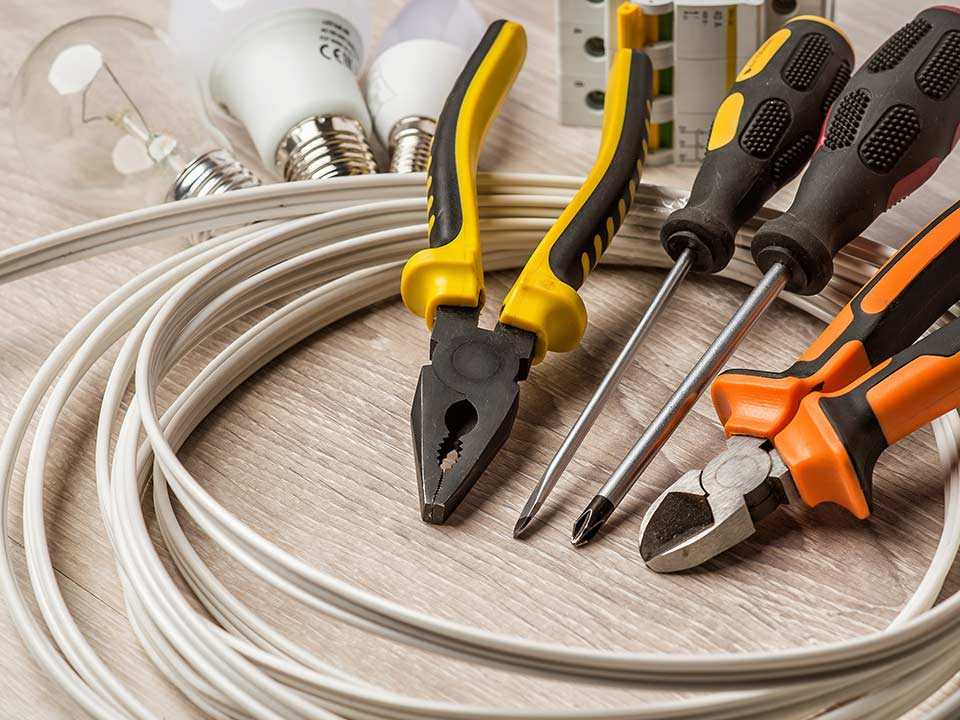Step-by-step guide on how to become an electrician in the UK
3-minute read

Electricians are in constant demand. If you’re looking to take the leap into self-employment, becoming an electrician can be a great way to work for yourself and boost your earning power.
So what do self-employed electricians in the UK earn, and how do you become one? Read on for our comprehensive guide.
What do self-employed electricians do?
Electricians have a range of responsibilities, and the exact type of work you do will depend on your specialist area. The day-to-day work for a self-employed electrician is likely to include:
- Installing electrical systems such as power systems and lighting
- Maintaining and checking electrical systems for efficiency and safety
- Repairing and rewiring
- Supervising other members of an electrical team
What is a self-employed electrician salary in the UK?
According to the National Careers Service, the average salary for a starter electrician is up to around £23,000. Experienced electricians can earn up to £35,000, and highly experienced individuals up to £42,000.
However, you should bear in mind that these figures are for employed electricians. As a self-employed person you’ll be able to set your own rates. It’s important to understand that most self-employed electricians work on a day rate. These can vary quite significantly depending on your specialism or experience, and can range from around £140 per day to £350 per day. For smaller jobs you might charge by the hour – hourly rates range from around £20 up to £50 per hour.
Sign up to our newsletter to get the latest guides for small businesses and the self-employed
Your email address will be used by Simply Business so that we can send you the latest guides, offers and tips. You can unsubscribe from these emails at any time. For more information, check out the Simply Business privacy policy.
How to become a self-employed electrician – step-by-step
1. Make sure you have the right qualifications
In order to work as a self-employed electrician, you’ll need some qualifications. Electricians are required to have at least a level three electrical or electro-technical qualification. As the Electrotechnical Skills Partnership points out, this must be awarded by either EAL or City and Guilds.
It’s crucial you embark on training that's recognised by the industry. Make sure you check that potential training providers are offering recognised qualifications, and that their staff are all qualified themselves.
Many self-employed electricians start out as Apprentices. An Apprenticeship will result in a level three qualification if properly completed, but securing a level one or two qualification in electrical installation may make it easier for you to secure a place on an Apprenticeship course.
2. Think about your other skills
If you’re changing career rather than just starting out, you may have existing skills that can act as a starting point. For example, if you’re a gas installer, you may be able to take shorter courses that instruct you in things like isolation and wiring skills. Again, regardless of the course you take, make sure it’s industry-recognised and at least level three.
3. Consider joining a competent person scheme
As a self-employed electrician you’re likely to carry out work that's required to be ‘notified’ under the Building Regulations – that is, you’ll need to notify the local authority in advance of work taking place. By joining a ‘competentent person scheme’ you can avoid this, and instead self-certify your work through the operator of the scheme. You’ll also be able to issue certificates such as the Electrical Installation Certificate. Different operators have different application processes, but popular schemes include the NICEIC and the NAPIT CPS.
3. Sort the legal side
There’s a number of important legal tasks you need to complete when going self-employed, regardless of the profession you’re choosing. First is choosing a legal structure. You’ll probably choose to operate as a sole trader, but in some cases it might make more sense to start a limited company. Both are easy to do. Read more about the differences between a sole trader and a limited company.
You’ll also need to make sure that you register with HMRC. As a self-employed person or a company director, you’ll need to file an annual Self Assessment tax return, or you might choose to find an accountant to help you do this. Remember to budget properly for your tax bill each year, and make sure you don’t forget the payment on account.
4. Get insured
Regardless of how many precautions you take, accidents do sometimes happen. For self-employed electricians, a single mistake can be financially crippling. It’s important you consider insurance.
There’s a range of covers you should look at as a self-employed electrician.
- The key cover is public liability insurance, which can protect you against claims arising from injury or loss suffered by a member of the public as a result of your work
- You might also consider employers' liability insurance, which is a legal requirement if you have staff. It can cover claims from employees if they've become ill or been injured as a result of working for you
- Additionally, you should think about tool cover to insure the items you rely on for your work
Simply Business provides tailored cover specifically for electricians, letting you combine all your different covers into a single policy. Compare electrician insurance quotes today.
5. Find clients!
Now that you’re all set up, it’s time to find some work. There’s a range of ways in which you might market your services as a self-employed electrician. You could start local, with tactics as simple as advertising in shop windows and local newspapers.
However, you should also consider digital marketing, which is becoming an important opportunity for tradespeople. We’ve compiled a comprehensive guide to online marketing for tradesmen, which includes some practical tips to get you started.
Do you need electricians' insurance?
As one of the UK's biggest business insurance providers, we specialise in public liability insurance, as well as cover for your tools and personal accidents. Why not take a look now and build a quick, tailored electricians' insurance quote?
Start your quote
Written by
Josh Hall
We create this content for general information purposes and it should not be taken as advice. Always take professional advice. Read our full disclaimer
Keep up to date with Simply Business. Subscribe to our monthly newsletter and follow us on social media.
Subscribe to our newsletterInsurance
Public liability insuranceBusiness insuranceProfessional indemnity insuranceEmployers’ liability insuranceLandlord insuranceTradesman insuranceSelf-employed insuranceRestaurant insuranceVan insuranceInsurersAbout
About usOur teamAwardsPress releasesPartners & affiliatesOur charitable workModern Slavery ActSection 172 statementSocial mediaSite mapAddress
6th Floor99 Gresham StreetLondonEC2V 7NG
Northampton 900900 Pavilion DriveNorthamptonNN4 7RG
© Copyright 2024 Simply Business. All Rights Reserved. Simply Business is a trading name of Xbridge Limited which is authorised and regulated by the Financial Conduct Authority (Financial Services Registration No: 313348). Xbridge Limited (No: 3967717) has its registered office at 6th Floor, 99 Gresham Street, London, EC2V 7NG.